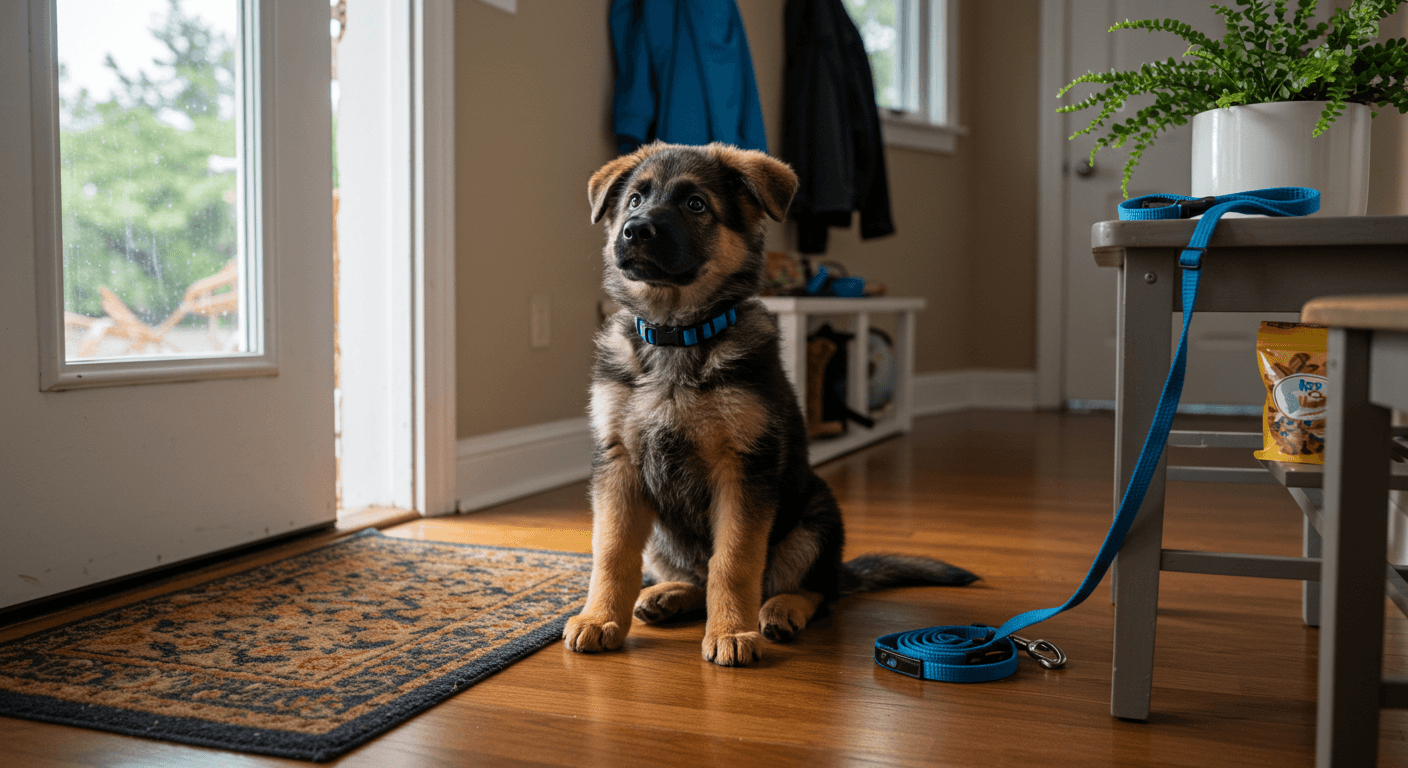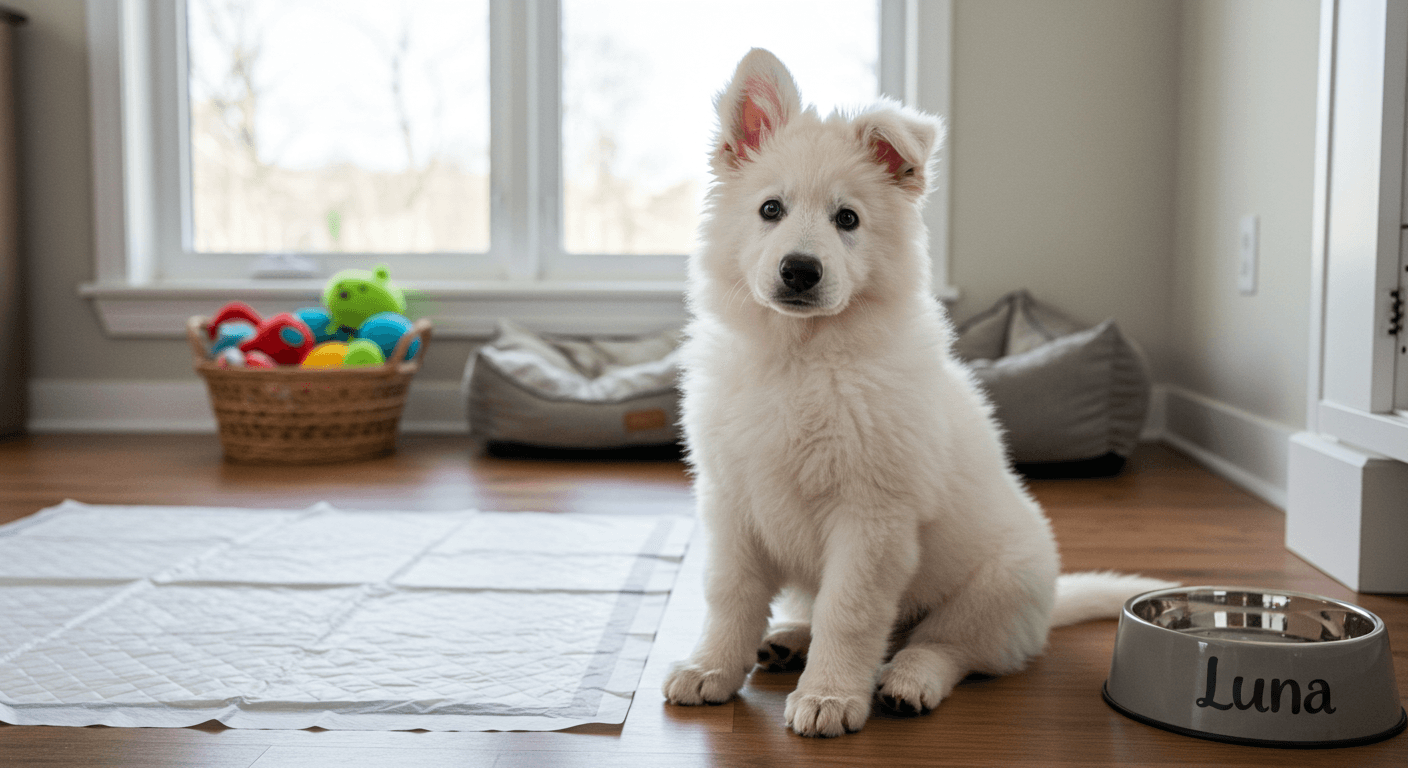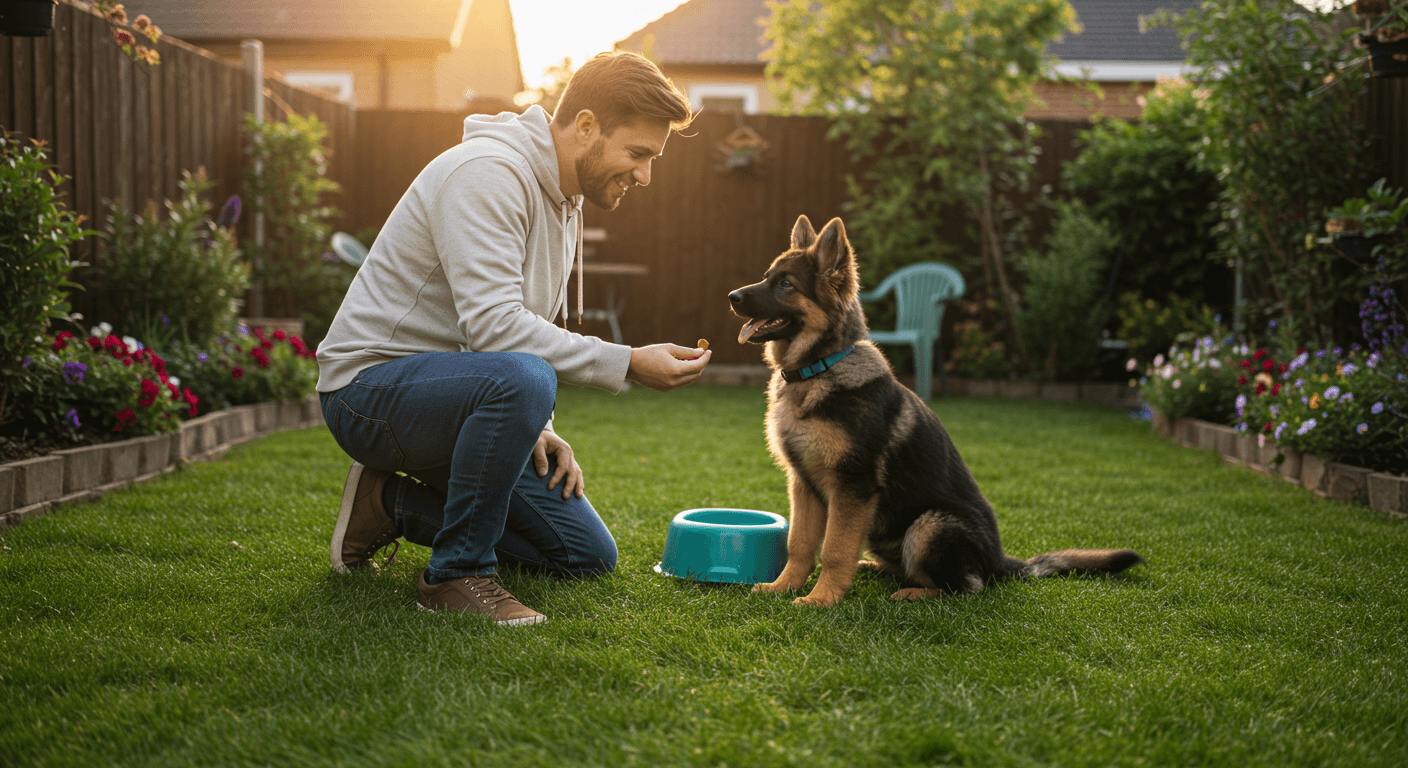Bringing a new German Shepherd puppy home is an exciting moment filled with cuddles, play, and, of course, lots of learning. One of the first big lessons for your pup is understanding where and when to go potty. That’s where a clear and consistent puppy potty training schedule becomes your best friend.
German Shepherd puppies are smart and eager to please. With the right plan, teaching them when to go potty can be easier than you think. But without a routine, even the smartest puppy can struggle. A solid puppy potty schedule gives your furry friend the chance to make good potty habits right from the start.
In this guide, we’ll walk you through how to potty train a puppy step by step, with tips designed especially for German Shepherd owners. Whether you're a first-time dog parent or looking for better ways to help your pup succeed, you’ll find everything you need to create a schedule that works for both of you.
By the end, you’ll have a clear plan to avoid indoor messes and teach your GSD pup where to go without stress. Let's get started building a puppy potty training schedule that actually works!
Why a Puppy Potty Training Schedule Works

Getting your new German Shepherd puppy used to a potty routine might feel like a big task at first. But having a puppy potty training schedule can make the whole process smoother, faster, and a lot less messy. It's all about building good habits right from the start.
Dogs, especially smart breeds like German Shepherds, love patterns. When your puppy knows when it's time to go outside, they quickly connect the schedule to the action. That means fewer accidents at home and more happy tail wags!
A potty training schedule gives your German Shepherd puppy clear guidance. It helps them know what to expect and when. Instead of guessing or giving random potty breaks, you’re giving your pup a solid plan to follow.
You might be wondering, "How long does it take to potty train a puppy?" The truth is, it depends on the dog and your consistency. But having a steady potty training schedule can cut the time down by helping your puppy learn faster.
Also, a good schedule supports toilet training by reducing stress for both of you. Your puppy feels more secure and less likely to panic or have accidents inside when they know potty time is coming.
- Builds routine: A regular potty training schedule teaches your pup when and where to go.
- Reduces accidents: Fewer surprises inside the house mean less cleaning and more peace.
- Supports faster learning: Structure speeds up how long it takes to potty train a puppy.
- Strengthens bonding: Teaching routines with love builds trust between you and your German Shepherd.
In short, sticking to a smart puppy potty training schedule is one of the best things you can do for your German Shepherd’s growth. It saves time, limits frustration, and sets your puppy up for success.
When to Start Potty Training Your Puppy

Puppy potty training is one of the first big steps a new German Shepherd owner takes. But many dog parents often wonder when to start training your puppy. Getting the timing right is key to starting off on the right paw. The sooner you introduce a routine, the easier it becomes for your pup to pick up good habits.
Most experts agree that potty training can start as early as 8 weeks old. At this age, your German Shepherd is starting to explore the world and can begin learning simple routines. An 8 week old puppy schedule should include regular meals, playtime, plenty of naps and consistent potty breaks.
Early training doesn’t mean expecting perfection. Young puppies have very small bladders and might need to go potty every 1 to 2 hours. You’re not aiming for instant results, but rather teaching your pup what to expect through a predictable puppy potty training schedule.
If your German Shepherd is older than 8 weeks, don’t worry. It’s never too late to build a potty training routine. Just be patient, watch for signs they need to go, and praise them when they do well.
Starting at the right time builds the foundation for long-term success. A clear puppy potty training timeline helps reduce accidents and keeps your pup happy and stress-free during this important stage of their life.
- Start at 8 Weeks: This is the ideal time for beginning potty training.
- Stick to a Schedule: A predictable 8 week old puppy schedule can speed up learning.
- Watch Closely: Keep an eye on signs like sniffing or circling these mean it’s potty time!
- Use Positive Reinforcement: Always reward your puppy with praise or treats when they go in the right place.
How to Potty Train Your Puppy: Step-by-Step Method

Potty training your German Shepherd puppy might feel like a big task, but with the right steps, it can be a smooth and rewarding process. This smart and loyal breed learns fast, but they still need consistency and patience. If you’ve been wondering how to potty train a puppy, especially one as energetic as a German Shepherd, don’t worry you’re in the right place!
How to Potty Train your German Shepherd Puppy in 7 Days
Before diving in, remember: dogs thrive on routines. That’s why having a solid dog potty training schedule is key. German Shepherds are quick learners when they know what to expect. Using crate training for potty training also helps your pup learn faster and keeps your home clean.
- Pick a Potty Spot – Choose a spot outside where your puppy should go every time. Consistency helps them understand that this is the bathroom zone.
- Use a Crate – A crate creates a safe space for your puppy and builds good habits. It supports the puppy crate training schedule, helping avoid accidents at night or when you’re away.
- Stick to a Routine – Feed and walk your puppy at the same times each day. A reliable puppy training schedule with crate time, play, and potty breaks will reduce stress and confusion.
- Praise and Reward – When your puppy does their business in the right spot, give them lots of praise or a small treat. This helps reinforce good behavior.
- Watch Closely – Look for signs like sniffing or circling. If you see them, take your puppy outside right away. Catching the signs early makes a big difference.
- Stay Patient – Accidents will happen it’s okay! Clean it well and move on. Getting upset may confuse or scare your pup.
As you follow these steps, your German Shepherd pup will start to understand what's expected. Over time, this regular puppy potty training schedule will build trust and success between you and your furry friend.
Puppy Potty Training Schedule by Age

Getting your German Shepherd pup on a good routine early can make potty training much easier for both of you. A smart way to do this is to use a puppy potty training schedule by age. Because puppies change quickly as they grow, their bathroom needs also change. Matching your potty schedule to your pup’s age helps prevent messy accidents while building good habits.
Let’s break it down by age, so you know exactly what to expect and how to keep your German Shepherd puppy on track. The goal is to set a clear routine based on potty time, feeding time, and crate time. As your pup grows, you'll adjust the frequency and timing of each part of the puppy schedule.
- 8–10 Weeks Old: At this stage, your puppy has a tiny bladder and can’t hold it long. Take them out every hour during the day, especially after eating, playing, or waking up. Crate time should be short no more than 2 hours at a time.
- 10–12 Weeks Old: You can begin stretching the breaks to every 2 hours. Keep a close eye and stick to a set puppy potty schedule. Your GSD is just starting to understand the routine.
- 3–4 Months Old: Your puppy can usually hold it for about 3 hours. This is a great time to connect a feeding and potty schedule to help reduce surprises. Keep crate time at about 3–4 hours, max.
- 5–6 Months Old: With better bladder control, your German Shepherd may go up to 4 hours between potty breaks. Start building a stronger routine that includes walk times and consistent meals.
- 6 Months and Up: Most German Shepherds can hold it for 6 hours or more, especially overnight. They should fully follow a solid puppy crate schedule and know their bathroom spots.
Use this age-based schedule as a guide, but remember, every puppy is different! Some may need more trips outside, while others catch on fast. Watch for signs like sniffing or circling to tell when it’s time to go.
A puppy potty training schedule by age helps make life smoother for everyone at home. It gives your German Shepherd structure, builds trust, and helps them become well-mannered faster.
How Often Does a Puppy Need to Go Out?
If you're raising a German Shepherd puppy, you might be wondering, "How often does a puppy need to go out?" The answer can vary, but having a solid puppy potty training schedule is key to helping your furry friend learn quickly and avoid accidents.
Puppies have small bladders, and they can’t hold their pee for long. As a rule of thumb, a puppy can hold it for about one hour for every month of age. So, a 2-month-old German Shepherd may need a potty break every two hours even during the night!
To stay on track with your dog potty training schedule, you’ll want to take your puppy out frequently. That means not just during the day, but also in the early morning and right before bed. By keeping a routine, you’ll teach your puppy when and where it’s okay to go.
- Right after waking up – Puppies often need to go as soon as they wake up.
- After eating or drinking – Mealtime kicks their digestion into gear.
- After play sessions – Excitement gets things moving!
- Every 1 to 2 hours during the day – Helps prevent accidents and guesswork.
- Right before bedtime – Ends the day clean and dry.
Each German Shepherd puppy is unique, so adjust the puppy potty schedule based on your pup’s needs. If accidents happen, don't worry. Just take them out more often and reward them when they go in the right spot!
Over time, stay consistent with your dog potty training schedule. Patience and routine go a long way in building great habits for a healthy and happy German Shepherd.
How Long After Eating Does a Puppy Poop?
When you're working on your German Shepherd puppy potty training schedule, one big question often comes up: how long after a puppy eats do they poop? Knowing this is important because it helps you plan potty breaks and avoid accidents in the house.
Most puppies, including German Shepherds, need to poop between 5 to 30 minutes after eating. Puppies have tiny tummies and fast digestion. This means food doesn't stay in their system long before nature calls. After meals, the stomach sends signals to the colon to get moving this is called the gastrocolic reflex.
To keep your puppy's potty plan on track, watch closely after mealtimes. Taking your pup out after every meal, at the right time, helps teach them when and where to go. You’ll create good habits and strengthen your puppy potty training timeline.
Use this rule of thumb: take your German Shepherd puppy outside 10 to 20 minutes after eating. This window is usually when they’ll need to go. Some puppies need a few minutes to sniff around, while others may go right away.
- Young puppies (8–12 weeks): Usually poop around 5–15 minutes after eating
- Older puppies (3–6 months): May take 15–30 minutes before needing to go
- After high-activity play: Your pup might need to poop sooner due to increased digestion speed
Watching your puppy's patterns helps fine-tune your potty routine. Keep a notebook or use a simple app to track what time they eat, play, and poop. This helps you build a reliable puppy potty training schedule that works with your routine and your GSD’s needs.
Realistic Expectations and Signs of Progress
When starting a puppy potty training schedule, it’s important to set realistic expectations. Many German Shepherd owners wonder, "how long does it take to potty train a puppy?" The truth is, every pup is different. But with patience and consistency, most German Shepherd puppies start showing real progress within a few weeks.
A good rule of thumb is that your puppy can hold their bladder for about one hour per month of age. So if your German Shepherd is three months old, they may need a potty break every three hours. That’s why a consistent potty training schedule matters so much. It helps prevent accidents and teaches your pup where and when it's okay to go.
To keep things realistic, remember that potty training isn’t perfect right away. Accidents will happen. But don’t worry they’re part of the learning process. What’s important is staying calm, correcting gently, and celebrating small wins.
Here are a few signs that your puppy potty training schedule is working:
- Fewer accidents: You notice less mess in the house each week.
- Predictable bathroom habits: Your German Shepherd starts going at regular times.
- Asking to go outside: Your puppy may wait by the door or whine.
- Staying dry longer: Your dog can hold it for longer between breaks.
Along with these signs, using simple puppy toilet training tips can speed up the process. Stay on a routine, reward success with praise or treats, and stick to one potty spot in your yard. Soon, your German Shepherd pup will get the hang of it!
Creating a puppy potty training schedule is one of the most important steps for raising a happy and well-behaved German Shepherd. While the process takes time and patience, sticking to a consistent plan helps your pup learn faster and reduces indoor accidents.
Throughout this guide, we’ve covered key steps on how to potty train a puppy effectively. From setting a regular bathroom routine to understanding signs your puppy needs to go, each part plays a big role in your success. Remember, your German Shepherd puppy depends on your consistency. Making a solid plan and following it will lead to great results.
Whether you’re following a puppy potty training schedule by age or adjusting one based on your dog’s personality, the most important thing is to stay calm and encouraging. Celebrate small wins, even when progress feels slow. Every outdoor potty break is a step toward a confident and clean adult dog.
If setbacks happen, don’t worry. All puppies have accidents now and then. Go back to the basics, adjust the schedule if needed, and keep reinforcing good habits with praise and consistency. Stick with it, and your German Shepherd puppy will learn what to do in no time.
With love, repetition, and your helpful puppy potty training schedule, you’re giving your GSD the best start to a healthy and happy life.



